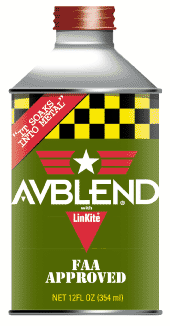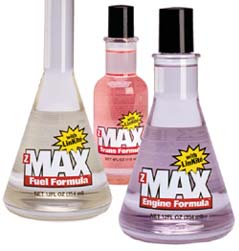|
|
|
 Blue
Corral, the manufacturers of the Slick 50 engine oil additive, have been
banned by a Federal Commission from making claims about reduced engine
wear, increased fuel economy and lower running temperatures in it's advertising
in America. The Federal Commission found the company's claims of increased
performance and reduced wear were unsubstantiated, and Blue Corral has
agreed to pay upwards of $20M in damages to affected customers.
Blue
Corral, the manufacturers of the Slick 50 engine oil additive, have been
banned by a Federal Commission from making claims about reduced engine
wear, increased fuel economy and lower running temperatures in it's advertising
in America. The Federal Commission found the company's claims of increased
performance and reduced wear were unsubstantiated, and Blue Corral has
agreed to pay upwards of $20M in damages to affected customers.
 The
manufacturers of the ProLong engine additive have been dealt a smack in
the face by a Consumer Reports Magazine report into their product. CR attempted
to reproduce the "no oil" test where all the oil was drained out of an
engine which had been treated with ProLong, and then the engine was run.
CR managed a maximum of 13 seconds running out of each of two engine before
they seized up, welding the pistons to the barrels. The case is being brought
to a Federal Commision for prosecution for false advertising claims.
The
manufacturers of the ProLong engine additive have been dealt a smack in
the face by a Consumer Reports Magazine report into their product. CR attempted
to reproduce the "no oil" test where all the oil was drained out of an
engine which had been treated with ProLong, and then the engine was run.
CR managed a maximum of 13 seconds running out of each of two engine before
they seized up, welding the pistons to the barrels. The case is being brought
to a Federal Commision for prosecution for false advertising claims.
See: http://www.ftc.gov/opa/2000/03/motor.htm
 AVBLEND
is an FAA approved pure micro-lubricant with a scientifically modified
molecular structure. This unique reformulation process allows AVBLEND to
penetrate and soak into metal surfaces.
AVBLEND
is an FAA approved pure micro-lubricant with a scientifically modified
molecular structure. This unique reformulation process allows AVBLEND to
penetrate and soak into metal surfaces.
AVBLEND keeps friction surfaces cool during break-in period. One of the most important functions performed by AVBLEND is its ability to keep friction surfaces relatively cool while the metal is new -- during the break-in period.
Too much heat during this critical period while the metal is forming itself into its job can easily cause brittleness, loss of flexibility and a tendency to break under sudden and severe strains. AVBLEND allows metal to temper itself under working conditions and assume the right degree of suppleness and hardness for the job it is intended to do during its entire performance life. This is known as work tempering (energizing) and can only be accomplished under conditions where excess frictional heat is eliminated.
AVBLEND allows proper break-in to occur while reducing conditions for cylinder wall glazing during the initial hours of a new engine's life.
I have found nothing bad about this stuff to date. Can also be
used in Aircraft engines.
 The
latest in, well, not actually an Oil Additive!
The
latest in, well, not actually an Oil Additive!


 Here
is another one for ya!
Here
is another one for ya!
Engine treatments containing high levels of chlorinated substances such as chlorinated paraffins, are being advertised as "new, space-age technology." Actually, chlorinated "extreme pressure" lubricants have been used in industrial applications for decades. However, these substances were never intended for use in automotive engines due to their inherent corrosive nature.
Engine treatments that contain solid particles suspended in a carrier oil are classified as colloids. They are also known as solid-film lubricants. This category includes Teflon® or PTFE (polytetrafluoroethylene-a plastic-like resin), molybdenum disulfide (commonly known as Moly) and graphite.
These products employ an entirely mechanical procedure known as burnishing to deposit solid particles onto metal surfaces. And since there are no chemical processes involved, this action is mostly uncontrolled and therefore unpredictable. Consequently, engineered tolerances may be affected. Also, solid particles can restrict the flow of oil through critical passages, galleries and the filter leading to costly repairs.
Remember, PTFE in oil additives is a suspended solid. Now think about why you have an oil filter on your engine. To remove suspended solids, right? Right. Therefore it would seem to follow that if your oil filter is doing its job, it will collect as much of the PTFE as possible, as quickly as possible. This can result in a clogged oil filter and decreased oil pressure throughout your engine.
In spite of the fact that PTFE-based engine treatments have been available for many years, even their manufacturers have yet to agree on basic issues such as how much PTFE should be added to an engine and how long a single treatment will last.
Therefore, in the absence of generally accepted standards, conclusive test results and even industry-wide support for these products, there is simply no reason to buy any conventional oil additive or engine treatment now that a truly superior alternative exists.
Just take a look at your supermarket stores. The oil additives
have been falling in price steadily, and are now offering a complete care
package (Oil, Trans, Fuel & Collant additives in one nice package)
for the same price as the single additive was when it first came out.